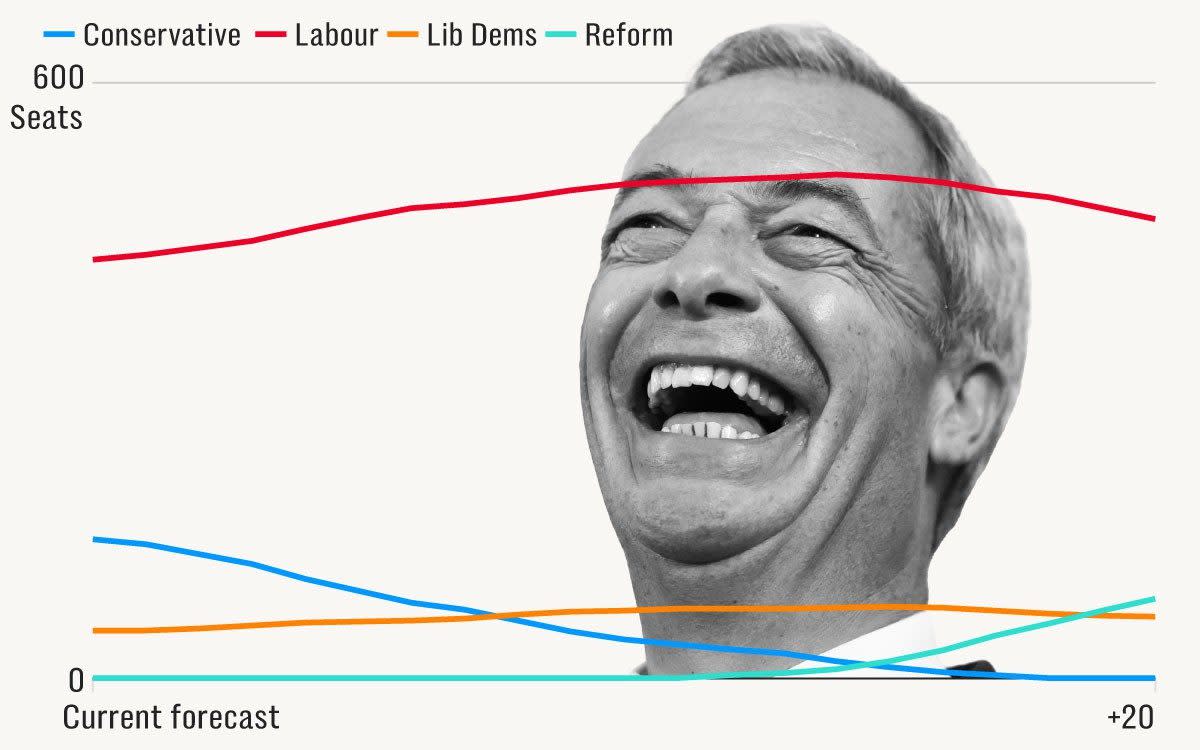Why Reform will struggle to win any seats – despite beating the Tories in the polls

One week ago, Nigel Farage voiced his goal for Reform to overtake the Conservatives in the polls.
On Thursday, a YouGov poll said he had finally achieved it, surpassing the Tories by one point.
The poll has Reform on a national vote share of 19 points, with the Conservatives trailing on 18. Labour continues to be way ahead on 37 points.
It is important to note this is just one poll: across 12 pollsters’ latest polls, Reform are averaging on 14 per cent, compared to the Conservatives on 22 per cent.
Reform has seen a jump in support – around 3 to 4 per cent since the election was called.
Despite this, very few experts, including the party itself, predict it will secure more than a handful of seats.
This is because, unlike a party like the Liberal Democrats, support for Reform is spread evenly across the country rather than being concentrated in a small number of seats. So while it can score high in nationwide polls, it may not be able to secure enough support in individual seats to claim success – especially given the UK’s first past the post electoral system.
Are Reform on course to win seats in Parliament?
Speaking to BBC Breakfast on Friday, Mr Farage said: “Whatever we do, we may not get the number of seats we deserve, but are we going to win seats in Parliament? Yes.”
The latest YouGov MRP – which polls voting intention in each constituency, surveying some 50,000 people in total – conducted just before Mr Farage took control of the party, had the party on no seats whatsoever.
However, Mr Farage is clearly optimistic that the recent surge in the polls since his return to the helm of Reform will result in the party sending MPs to Westminster.
Hypothetically, Reform will need a much larger percentage of the vote than has been seen so far for his party to secure more than a couple of seats.
What constituency swing is needed?
This latest MRP, which uses modelling and constituency-level polling to predict individual seat outcomes, had Labour on 422 MPs to the Conservatives 140 MPs.
On average, across all the seats, Reform secured 10.2 per cent of the vote share in the survey. This left it in second place in 27 seats, but the winner in none.
In a situation where, uniformly across all seats, each vote gained by Reform was stolen solely from the Conservatives, the party would need to see its share increase by 12 points before it started picking up seats.
This is because in the seats where Reform comes second, it is Labour that stands in the way, not the Conservatives and, even where it is in second, it is substantially behind the projected winner.
For example, YouGov’s MRP has support for Reform at its strongest in Barnsley North, at 23 per cent to the Tories’ 7 per cent. If every Conservative voter abandoned the party and threw their weight behind Reform, its share would rise to 30 per cent. It would still lose to Labour, polling there at 48 per cent.
If there was a uniform 12-point swing to Reform in every seat from current polling levels, Reform would return three MPs: Mr Farage in Clacton, Richard Tice in Boston and Skegness and a third in New Forest East.
It would not be until a 15-point swing from the Tories to Reform that it would secure over 10 seats. And a massive 19-point swing would be needed to get them above the Lib Dems, in which case the Conservative party would be left without a single seat.
In a second scenario, where for every two votes Reform steals from the Conservatives, it takes one from Labour, Reform getting an MP elected is more within reach.
In this scenario, Reform gets its first and only seat with an 11-point swing. Interestingly, its first winner isn’t the party leader, but Garry Sutherland in Exmouth and Exeter East.
Lee Anderson would join the Reform victors with a 12-point swing, Mr Farage and Mr Tice after a 14-point swing, and a 17-point swing would see them become the second party on 81 seats.
Why is it so difficult?
The bar for becoming a major political party is incredibly high.
This is almost entirely explained by the first-past-the-post system, where parties are punished if their support is distributed widely instead of focused in a small number of seats.
For Reform voters, one point of contention will likely be that the Liberal Democrats, currently trailing them nationwide on 10 per cent of voting intention, are predicted by the YouGov MRP to secure 48 seats.
Crucially, this Liberal Democrat vote share is extremely focused in some areas.
The Liberal Democrats are projected to gain less than 10 per cent of the total vote share in around three quarters of seats across the country. Reform on the other hand is predicted to experience vote share this low in fewer than half of seats.
However, the Lib Dems could see shares of over 30 per cent in around 11 per cent of all seats. Reform is not expected to see this anywhere.
Effectively, this means that while Reform has a more uniform level of middling vote share across seats, the Liberal Democrats experience very high support and very low support.
This feeling is not unique to Reform.
The Greens could have its vote share triple this year and even become the second party with younger parties, but are still only projected to pick up Brighton Pavillion and – maybe – Bristol Central.


 Yahoo News
Yahoo News 
